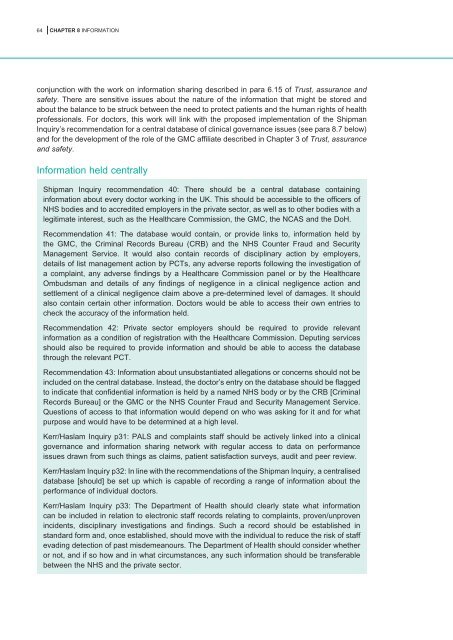Safeguarding
Safeguarding patients - BiP Solutions Ltd.
Safeguarding patients - BiP Solutions Ltd.
- No tags were found...
You also want an ePaper? Increase the reach of your titles
YUMPU automatically turns print PDFs into web optimized ePapers that Google loves.
64 CHAPTER 8 INFORMATION<br />
conjunction with the work on information sharing described in para 6.15 of Trust, assurance and<br />
safety. There are sensitive issues about the nature of the information that might be stored and<br />
about the balance to be struck between the need to protect patients and the human rights of health<br />
professionals. For doctors, this work will link with the proposed implementation of the Shipman<br />
Inquiry’s recommendation for a central database of clinical governance issues (see para 8.7 below)<br />
and for the development of the role of the GMC affiliate described in Chapter 3 of Trust, assurance<br />
and safety.<br />
Information held centrally<br />
Shipman Inquiry recommendation 40: There should be a central database containing<br />
information about every doctor working in the UK. This should be accessible to the officers of<br />
NHS bodies and to accredited employers in the private sector, as well as to other bodies with a<br />
legitimate interest, such as the Healthcare Commission, the GMC, the NCAS and the DoH.<br />
Recommendation 41: The database would contain, or provide links to, information held by<br />
the GMC, the Criminal Records Bureau (CRB) and the NHS Counter Fraud and Security<br />
Management Service. It would also contain records of disciplinary action by employers,<br />
details of list management action by PCTs, any adverse reports following the investigation of<br />
a complaint, any adverse findings by a Healthcare Commission panel or by the Healthcare<br />
Ombudsman and details of any findings of negligence in a clinical negligence action and<br />
settlement of a clinical negligence claim above a pre-determined level of damages. It should<br />
also contain certain other information. Doctors would be able to access their own entries to<br />
check the accuracy of the information held.<br />
Recommendation 42: Private sector employers should be required to provide relevant<br />
information as a condition of registration with the Healthcare Commission. Deputing services<br />
should also be required to provide information and should be able to access the database<br />
through the relevant PCT.<br />
Recommendation 43: Information about unsubstantiated allegations or concerns should not be<br />
included on the central database. Instead, the doctor’s entry on the database should be flagged<br />
to indicate that confidential information is held by a named NHS body or by the CRB [Criminal<br />
Records Bureau] or the GMC or the NHS Counter Fraud and Security Management Service.<br />
Questions of access to that information would depend on who was asking for it and for what<br />
purpose and would have to be determined at a high level.<br />
Kerr/Haslam Inquiry p31: PALS and complaints staff should be actively linked into a clinical<br />
governance and information sharing network with regular access to data on performance<br />
issues drawn from such things as claims, patient satisfaction surveys, audit and peer review.<br />
Kerr/Haslam Inquiry p32: In line with the recommendations of the Shipman Inquiry, a centralised<br />
database [should] be set up which is capable of recording a range of information about the<br />
performance of individual doctors.<br />
Kerr/Haslam Inquiry p33: The Department of Health should clearly state what information<br />
can be included in relation to electronic staff records relating to complaints, proven/unproven<br />
incidents, disciplinary investigations and findings. Such a record should be established in<br />
standard form and, once established, should move with the individual to reduce the risk of staff<br />
evading detection of past misdemeanours. The Department of Health should consider whether<br />
or not, and if so how and in what circumstances, any such information should be transferable<br />
between the NHS and the private sector.


